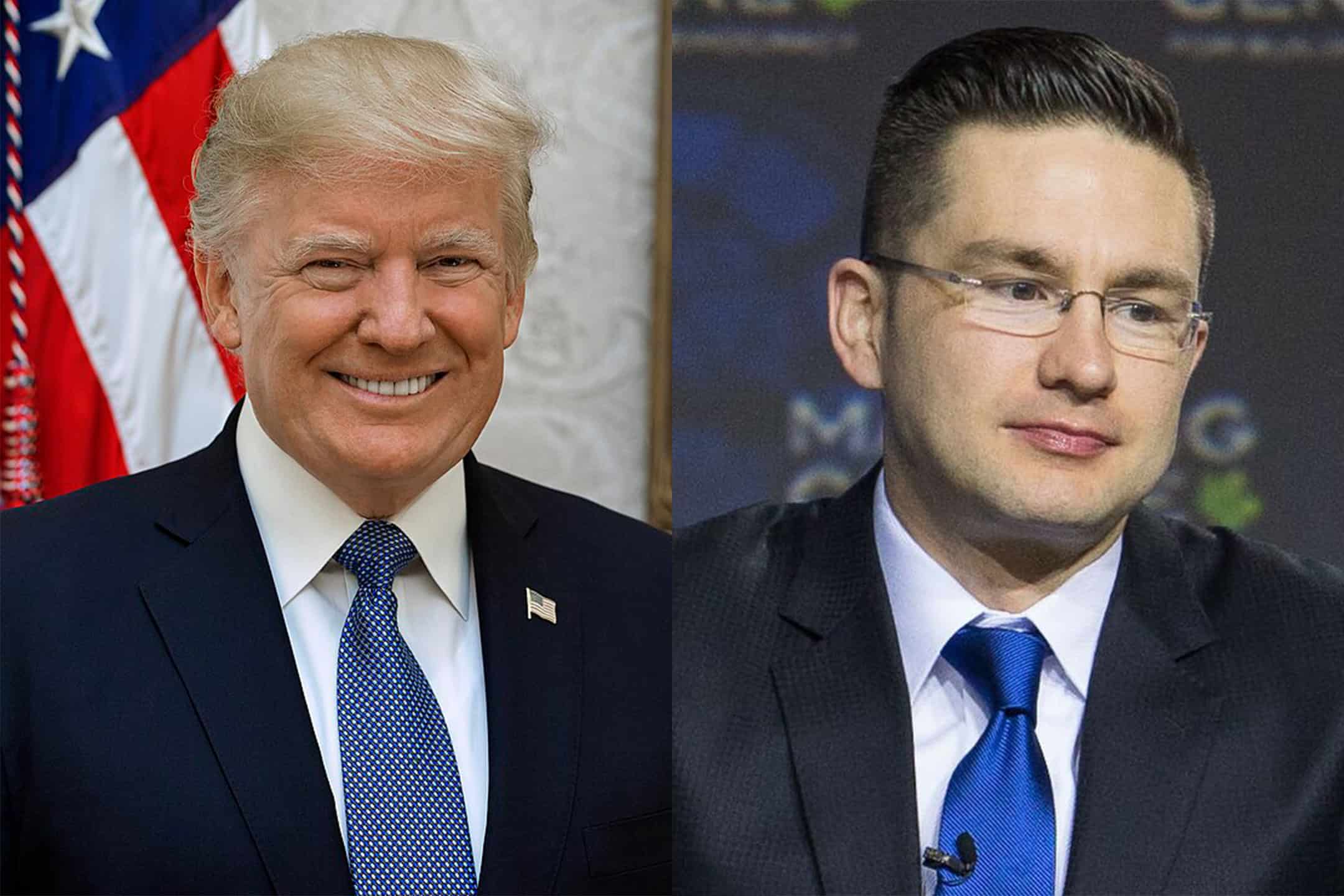There is a good chance that next year, both the US and Canada will be run by conservative leaders for the first time since 2009. While the US presidential race remains a coin toss, Republican candidate Donald Trump is polling significantly better than before he won in 2016. Similarly, in Canada, Conservative Party leader Pierre Poilievre is maintaining an impressive 20-point advantage in the polls.
Given their concurrent rise, Liberal opportunists on this side of the border have attempted to portray the two men as one. Finance Minister Chrystia Freeland referred to Poilievre’s caucus as “MAGA maple syrup,” suggesting her opponent shares similarities with the former president.
But is this comparison — which Abacus Data reported in January that four in 10 Canadians agree with — valid?
Though the two camps have always been somewhat distinct, I believe that American Republicans and Canadian Conservatives are further apart than at any time in recent memory. For decades, they shared a relative ideological alignment. However, core tenets of ‘Trump-ism’ are now cemented into the Republican candidate’s platform, and Canadian Conservatives, in my view, have not followed in America’s footsteps.
We have a federal election approaching, and I see this clarification as necessary to better inform voters who are inclined to support or oppose Poilievre simply because they believe he is Trump.
Free trade skepticism
Of all the positions that animate ‘Trump-ism,’ the former President is perhaps most consistent in his criticism of free trade, which he blames for driving American industry and jobs overseas. During his term, Trump renegotiated the North American Free Trade Agreement with Mexico and Canada, aiming to create a more favourable trade balance for the US and new labour provisions and agriculture industry policies.
Today, he is as ambitious as ever, pledging to remove the federal income tax and instead fund the government through a 10 per cent tariff — a tax imposed on goods and services entering the US. By doing so, he claims to be rejecting “the siren song of globalism” in favour of an economic model which puts Americans back in the driver’s seat.
Poilievre, by contrast, emphasizes the need to further embrace a “free enterprise approach to governance,” highlighting a plan to establish free trade with Australia, New Zealand, and the UK.
Far from being a “Tariff Man” — what Trump refers to himself as — Poilievre’s plan focuses on vigorously pursuing the “reduction of international trade barriers and tariffs.”
Non-interventionist foreign policy
Trump’s “America First” message also extends into the realm of foreign policy. In 2016, he famously denounced the idea of committing trillions of dollars to endless foreign conflicts and he told Republican politician Jeb Bush in a 2016 debate that the Iraq War was a “big fat mistake.”
His non-interventionism is most evident in the Russia and Ukraine war. His current running mate, JD Vance, is a vocal opponent of wartime aid. Additionally, Trump himself has said that he vows to persuade Ukrainian President Volodymyr Zelensky and Russian President Vladimir Putin into peace negotiations.
Poilievre, however, adopts a position more aligned with the North Atlantic Treaty Organization: he promised that Canada would always support Ukraine. In a rally earlier this year, he criticized Prime Minister Justin Trudeau for failing to provide an additional $400 million in air defence to Ukraine. Poilievre even derided Putin as a “tyrant” bent on global conquest — a leader whom Trump claims to have a “good relationship” with.
Immigration restrictionism
Since 2015, hardly a day has gone by where Trump does not rail against the perils of illegal immigration, which he claims involves the smuggling of “drugs” and “crime” into America. His solutions have become increasingly hardline, now including a call for the largest deportation operation in American history that targets millions of undocumented immigrants.
He also took aim at legal immigration while in office. Through 472 executive actions aimed at immigration policy, Trump banned migration from seven Muslim-majority countries, stunted refugee admissions, increased green card denial rates, and oversaw reducing the number of foreign-born residents in America.
Alternatively, Poilievre’s immigration position is less defined and appears to fluctuate with public sentiment. He has criticized Trudeau for threatening to deport victims of student visa scams and for failing to fast-track the migration of high-skill applicants.
However, more recently, Poilievre has moderated his stance in response to decreased public support for immigration and suggested that Canada should tie the number of accepted immigrants to the availability of housing.
While Poilievre’s position is restrictionist, it notably differs from Trump’s. It seems to me that Poilievre views immigration as a mathematical problem, whereas Trump frames it in terms of crime and national sovereignty.
I acknowledge that trade, foreign policy, and immigration are not the only issues worth considering. Nonetheless, I believe they are essential for comparing Trump and Poilievre and, by extension, American and Canadian conservatism.
Therefore, as long as Polievre’s Conservatives stand opposed to Trump on these topics, I believe they remain fundamentally different in irreconcilable ways.
Whether that is good or bad, I will leave it up to the readers.
Sandro Galati is a fourth-year undergraduate student studying political science and ethics, society, and law.


